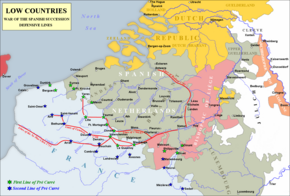Battle of Malplaquet
After taking Tournai in early September, the Allies besieged Mons, whose capture would allow them to enter France itself, and Louis XIV ordered Villars to prevent its loss.
By early 1709, the French state was bankrupt, while the severe winter of 1708–1709 caused widespread famine; garrisons at Tournai, Arras, St Omer, Valenciennes and Cambrai all mutinied over lack of food and pay.
[5] For their part, the Allies were convinced France was on the verge of collapse, and looked to keep up the pressure by advancing through the line of border fortresses known as the Frontière de fer.
While French strategy was always ultimately determined by Louis XIV, that of the Allies had to be approved separately by the British, Dutch and Austrian governments, which often required compromise.
Marlborough, the Allied commander, considered the positions held by Villars too strong for a frontal assault, and since the Dutch opposed his preferred option of Ypres, he agreed to make Tournai the main objective for 1709.
[6] Although persistent heavy rain caused further delays, the siege of Tournai commenced on 15 June; one of the strongest fortresses in France and held by a garrison of 7,700, it surrendered on 3 September and Marlborough immediately marched on Mons.
[7] Having assumed Tournai would hold out until October and thus consume the entire 1709 campaign season, Louis now ordered Villars to prevent the loss of Mons "at all costs...the salvation of France is at stake".
[8] Knowing Villars had been instructed to fight for Mons, Marlborough and his deputy Prince Eugene of Savoy were confident of winning a victory that would effectively end the war.
[2] The Allies delayed their attack pending the arrival of 1,900 men from Tournai under Henry Withers, a decision criticised then and later, one analyst arguing "the battle should have taken place on 10 September, or not at all".
[9] This gave Villars an extra day to construct defensive positions, including earthworks covering the open ground in the centre, and additional entrenchments extending into the woods on either side.
Three hours of close combat ensued, both sides taking heavy losses; Prince Eugene was slightly wounded, but refused to leave the field.
After initial success, they were repulsed, and the Prince of Orange and Sicco van Goslinga then ordered another 17 battalions to support Fagel by attacking French positions around Blairon Farm.
Withers and the detachment from Tournai arrived too late to support the Dutch, and were instructed instead to make a flanking move north of the French lines in Sars Wood.
[52][53] When negotiations resumed in March 1710, the French strategic position was largely unchanged,[54] but Maplaquet accentuated Allied divisions over war aims and their associated cost.
[56] In that respect, Malplaquet had less impact on British policy than Spanish successes the same year at Alicante and La Gudina, which made prospects of victory there increasingly remote.
[59] In spring 1710, the Allies resumed their advance almost unopposed; by September they had broken through the secondary line of the "Pré carré", capturing Douai, Béthune, Aire and Saint-Venant.
[63] Reluctance to continue fighting for what seemed marginal gains resulted in a landslide victory for the Tories in the October 1710 British general election, although they confirmed their commitment to the war to prevent a credit crisis.
[66] The Dutch blamed their losses on Marlborough's tactics, Withers for allegedly failing to support their attack, and the Prince of Orange for continuing when it became clear the French positions were too strong.
[67] Although Grand Pensionary Anthonie Heinsius and several Dutch regenten felt the casualties justified more stringent peace terms, others considered this unrealistic.
Sicco van Goslinga, a Dutch field deputy attached to Marlborough's staff, argued such casualties were to be expected, given they had taken Tournai and Mons, "two of the strongest fortresses in Europe", and won "one of the hardest battles ever fought".
[68] While the capture of Bouchain in September 1711 removed one of the last significant obstacles to the Allied advance, the new British government had already secretly negotiated peace terms with Louis XIV, signing the Preliminary Articles of London on 8 October 1711.





